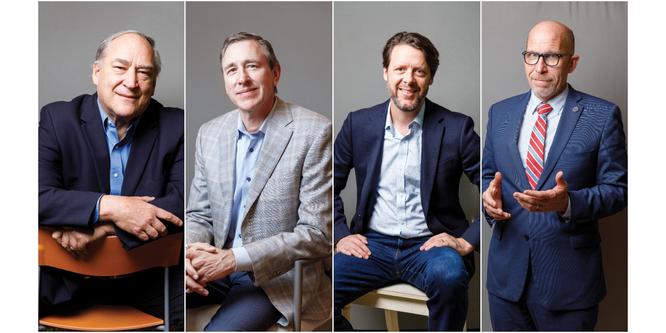Montgomery County executive candidates, clockwise from top left, Hans Riemer, Marc Elrich, David Blair, Tom Hucker
File photos
During a March 6 public safety and education forum for Montgomery County executive candidates — hosted by Bethesda Beat and Bethesda Magazine — readers submitted many questions.
Near the end of the forum, there was only time for a few audience questions on the forum topics, but many readers submitted questions on other topics. This week, Bethesda Beat asked the candidates to respond to some of those other audience questions, with a maximum of 100 words per answer. Here are the questions and their responses.
—Andy Schotz, managing editor, Bethesda Beat
***
Q: Do you think the county did a good job managing the pandemic? What would you have done differently?
Marc Elrich: Yes. The county did a better job handling the pandemic than most places in the country. We quickly understood the limits of our reach within communities and we partnered with local organizations in a way that we had not done on such a wide scale before.
We went further than the state did and prioritized our senior population when distributing the vaccine once it became available. We prioritized equity in testing and vaccination efforts so that all our different populations had high rates of vaccination and access to testing.
Hans Riemer: Like other communities with our social characteristics, our community is highly vaccinated. I’d largely attribute that to choices made by our residents, although the county put supportive policies in place. The council pushed hard to create vaccination campaigns targeting Hispanic and African American residents, which the executive implemented.
There have also been missteps:
David Blair: More effective communication, collaboration, and creativity. I’d convene a weekly press conference with our health experts and MCPS to communicate the science behind our decisions at one time to prevent the confusion we’ve experienced. I’ll collaborate with our governor. Too many of us had to drive to mass vaccination sites elsewhere because Montgomery County didn’t have a site.
We must be more creative. There’s no excuse why we didn’t have education hubs for all families in September 2020 and rapid tests and sensible quarantine rules to return to smooth in-school operations in September 2021.
Tom Hucker: We did a good job thanks to our residents, who value science and supported critical mitigation measures.
As executive, I would have addressed the significant racial equity gap that left our Black and Brown residents behind in access to testing and vaccinations. I would have worked collaboratively with Gov. Hogan to secure a mass vaccination site immediately, rather than forcing our residents to travel to other counties due to our executive’s needlessly antagonistic relationship with the governor. And I would have continued rental inspections, but Mr. Elrich suspended inspections of unhealthy and dangerous apartment buildings, putting tenants at great risk.
***
Q: What would be your specific criteria for reimposing or imposing further coronavirus restrictions on county residents in the future if there is a new surge in cases?
Elrich: We know that what the county did to mitigate the impacts of COVID worked. We know masks work. We know social distancing works. We know that vaccines work.
The success story the county became with our high vaccination rates is the success story of Montgomery County residents doing their part and following our science-driven approach. It is thanks to them our lower case rates led to lower death rates.
Riemer: The next variant could be more deadly — or it could be less so. We will need to react accordingly.
If there is no new variant, presumably we will have a winter omicron surge next year. As we prepare, I would support a proof of vaccination requirement and masking for certain indoor settings during the surge (and lifting that after the surge has subsided).
It’s important to note that we are moving past using just cases as our marker and now are looking at both cases and hospitalizations to determine the need for restrictions.
Blair: We will follow state and CDC guidelines. There would need to be a compelling, scientific basis for local restrictions above and beyond what the state and CDC recommend for a jurisdiction, particularly given the high vaccination rates in Montgomery County.
All decisions would be made with full transparency. I would work with leaders of surrounding jurisdictions and strive for a level of consistency. For example: When Prince George’s County opened up restaurants, our residents went there to dine as our restaurants were still closed for in-person dining. COVID-19 isn’t aware of county borders. A regional approach would be more effective.
Hucker: Throughout 2021, I led the council’s work as the chair of the County Board of Health, which approved all the restrictions that kept residents safe. The council followed the best health advice from our health officer and HHS. Our actions received praise from Dr. Anthony Fauci and many others.
In the event of a new surge, it is critical that we continue to follow the guidance of health experts. We must formulate now what the triggers will be for mitigation measures, so the public understands them and is ready. Transparency and clear communication are key to successful public health strategies.
***
Q: Are you participating in public financing? What steps would you take to reduce the influence of developers if you are elected?
Elrich: Yes. I used public financing in 2018 and it has been a great way to get people involved in campaigns — they see their small donation make a big difference.
I also remain the only candidate who is not taking and has never taken money from developers and their lawyers. I believe voters should never have to question whether candidates are looking out for the people’s interests or their own.
Riemer: Yes, I am participating in public finance – proudly. Marc Elrich and I are the only two candidates who are. I am taking no contributions from PACs or corporations and no donations larger than $250.

I make my decisions on the merits. I generally support smart growth and want our community to get the benefits of development in places like Bethesda, North Bethesda, Rockville, Gaithersburg, Silver Spring, and East County.
My vote is not for sale and the voters will always know that I make my decisions with integrity. And unlike other candidates, 100% of my donations are from grassroots donors.
Blair: I support public financing because it allows more candidates to run effective campaigns, which improves our county.
I’m not participating in public financing because I need significant resources to run countywide and counter the taxpayer-funded county government communications operation of my opponents.
I support strengthening the county’s public financing system through funding and legislation to reduce the influence of all special interest groups.
Hucker: I led the campaign to pass state legislation that allowed public financing in Montgomery County, and have supported public financing for 16 years.
Unlike public financing in other areas, our program doesn’t allow publicly financed candidates to access additional funds if they compete with candidates who can self-finance millions of dollars. I will decide before the deadline whether to join the public financing system.
I have a long track record of advocating for residents’ needs, rather than any special interests. I fully support stronger transparency requirements for elected officials & the Planning Board, and funding the Office of People’s Counsel.
***
Q: Do you support transferring some traffic enforcement functions from the police department to another body?
Elrich: Yes, one way that I’d like to see this happen is automated traffic enforcement for non-moving violations — for example, issuing repair orders for things such as missing light bulbs or a cracked windshield. We can use technology to gather photographic evidence to issue these repair citations.
Riemer: Yes, I do, and I have been one of the county’s leading officials calling for that to take place. The county executive has been moving too slow to make it happen.
Certain kinds of traffic stops carry great risk of negative interactions between the police and the community but also don’t contribute much to public safety. We need to approach traffic safety differently to minimize those risks and build more public trust in police work.
Blair: Some traffic enforcement functions may be more effective and efficient in the Department of Transportation. However, we must continually improve and work on police implicit bias and de-escalation training, as well as recruit highly qualified and diverse officers.
We will continue to need officers to enforce traffic violations in order to reduce dangerous driving (for example, driving under the influence or driving while distracted) and protect all roadway users.
Hucker: Automated enforcement is a proven tool for increasing compliance with speeding, distracted driving, and other similar laws.
Unfortunately, state law requires us to use sworn officers to approve automated tickets, so I led an effort to amend state law to allow transportation department professionals, rather than only sworn officers, to approve automated tickets. This will allow us to use our limited police resources more effectively, while reducing racial bias and escalation that can occur during routine traffic stops.
I would oppose removing police from traffic enforcement functions altogether.
***
Q: What should the priorities of Montgomery County Public Libraries be for the next four years?
Elrich: Libraries are vital to our community. I would like to be able to provide them the resources to maintain their collections, including their electronic collections.
We have made changes like eliminating fines and recognizing libraries as gathering places. The way people interact with their libraries has changed and they have helped people in pivoting to address the community’s needs.
During the pandemic, we have seen libraries transformed to distribution points for essential personal protective equipment and COVID-19 testing kits.
Riemer: First, staying open. The county executive has failed to get the libraries open during COVID-19, leaving users, particularly weekend users like families with young children and job-seekers, without support.
Second, providing a hub to help students accelerate on their learning path and gain ground that was lost during COVID-19, as a home for tutoring services, for example.
Third, providing more programming for seniors, who have also been isolated during COVID-19, with serious health implications.
Generally, libraries are amazing community centers that we need to build upon with more programming and creative investments.
Blair: We should create a library system that is a go-to resource to those in-need of technology and literacy services.
One priority for me would be to include the library system in our efforts to improve early childhood education. We can create a “Books from Birth” program, in which all registered families receive a free book each month from the library system until the child’s fifth birthday to encourage early childhood reading.
Hucker: Our public libraries are invaluable for people of all ages and backgrounds. We must continue to support MCPL’s work to increase literacy, engage families, build community, enrich seniors, close the digital divide, and more.
Over the next four years, my first priorities would be to resolve staffing issues, expand library hours, and explore collocation opportunities for libraries with other county facilities and services for seniors, youth and other residents.
I would also work to expand on language learning opportunities and cultural resources, and to embrace efforts to reimagine libraries for the future.
***
Watch the recording of the March 6 virtual forum:









